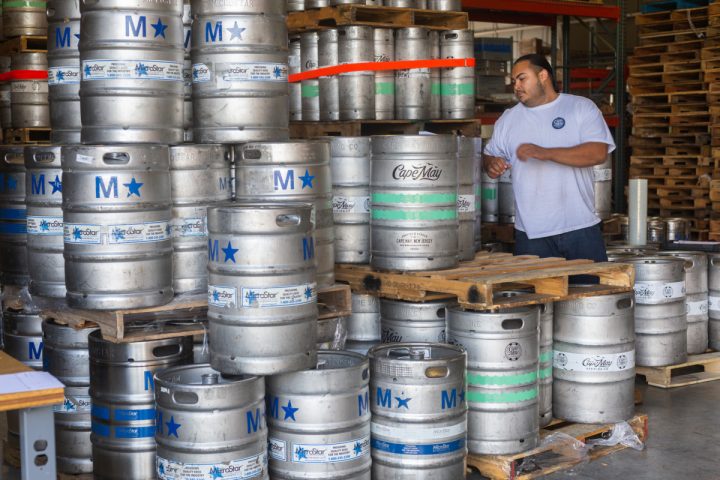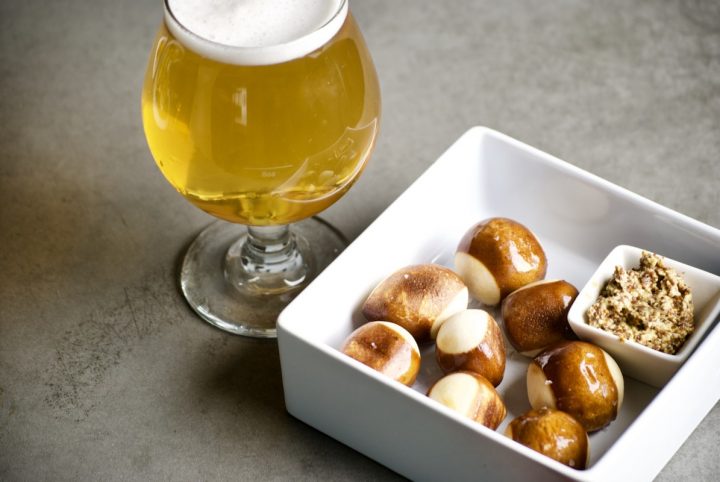
At the Shannon Rose Irish pub in Ramsey, New Jersey, customers could only find a fresher pour of Mango Jams New England-style IPA if they visited the brewery, which is just 17 miles away. The Shannon Rose offers a variety of releases from Mango Jams’ producer—Little Ferry, New Jersey-based Brix City Brewing—and sometimes takes delivery of beers kegged earlier in the day.
Customers at the Bier Stein, a restaurant, beer bar, and bottle shop in Eugene, Oregon, are savvy enough to know when the venue will be receiving a fresh keg of Sticky Hands Imperial IPA from Block 15 Brewing, less than 40 miles away. “They show up looking for it immediately,” says beer buyer Dave Stockhausen. “I do my best to order just enough to get me from one delivery to the next.”
At R&R Taproom in Woodstock, New York, owner Megan Reynolds sometimes takes matters into her own hands when it comes to fresh beer. Reynolds has been known to drive the 30 miles or so to Suarez Family Brewery in Hudson, New York to pick up a 20-liter keg of Palatine Pils, as the brewery doesn’t distribute in Woodstock. “It’s fun to get a keg fresh from the brewery and serve it to our customers,” Reynolds explains. “There’s a lot of good beer out there, but freshness is important. I get satisfaction from knowing that only the brewer and I handled the keg. It’s the best quality you can get.”
With local craft brewers now spread far and wide, the race is on for bars to provide the freshest beer possible. “It wasn’t as urgent to get same-day beer to our accounts back when light lagers with long shelf lives ruled,” says Rob Burns, co-founder and president of Night Shift Brewing in Everett, Massachusetts. But with styles like IPAs and Pilsners trending, he says, “those beers are at peak flavor when freshest.” Even within a certain style, locally produced beer can often have the edge over one delivered from far away. “A lot of the California IPAs have been sitting in warehouses and going from cold storage to warm to cold again,” says Ryan Krill, CEO of New Jersey’s Cape May Brewing Co., which distributes labels like Cape May IPA throughout the state via its Cape Beverage subsidiary. “When a local brewery can deliver a fresh beer the next day, consumers benefit.”

Brewer-Distributors
Propelling the expansion of brewery-fresh beers is the rise of self-distributing brewers. “In general, beer from local and self-distributing brewers is fresher than that of others, depending on the brewery,” says Stockhausen of the Bier Stein, which offers 24 rotating draft beers ($5-$10 an 8½-16 ounce pour), as well as nearly 1,000 packaged beers. At the Ginger Man in Boston, which features 73 beers on tap ($7-$9 a 16-ounce pour), beverage buyer Ben Plotkin says being able to buy directly from a local brewery gives him confidence that the beer is as fresh as possible. Among the Massachusetts breweries that the Ginger Man buys from directly are Cambridge-based Lamplighter Brewing Co., Fitchburg-based River Styx Brewing Co., and Everett-based Bone Up Brewing Co.
According to Scott Jones, the Shannon Rose’s assistant general manager, super-fresh beer helps drive customers to the bar, particularly when promoted via online services like Untappd. “People will come in because they just saw that a beer has been put on tap,’” he explains. In addition to Brix City, New Jersey brewers distributing to the pub include Fairfield-based Magnify Brewing Co., Ridgefield Park-based Bolero Snort Brewery, and Ocean Township-based Kane Brewing Co. They often help host Shannon Rose’s popular weekly trivia night, and some provide educational sessions for the pub’s wait staff. Shannon Rose offers 38 draft beers in all, priced $6-$9 a 10-16-ounce pour.
Stockhausen, meanwhile, enjoys the attention to detail that self-distributing brewers provide. “One advantage of self-distributing breweries is that they only represent themselves, so they can take the time to ensure that the product is fresh,” he says, noting that Corvallis, Oregon-based Block 15 Brewing Co. is particularly conscientious, as representatives check code dates on all of its packages when making a delivery. “Other wholesalers don’t do that,” Stockhausen notes.

Logistical Issues
While the rise of self-distributing brewers has meant fresher beer at many accounts, the practice has also brought challenges. Because of time constraints, R&R Taproom’s Reynolds tries to limit the number of meetings with local brewers to three or four a week. Other on-premise operators don’t mind accommodating the brewery representatives. James appreciates that some of them will text when certain beers become available. “Accepting delivery isn’t a problem either—their drops are relatively small compared to those of larger wholesalers,” he adds. Plotkin says the visits are only a small logistical challenge. “We relish that there are brewers who want to engage with their customers,” he says. “It’s great to be able to have personal interaction with a supplier.”
Nick Arzner, co-founder of Block 15, says the openness to working with self-distributing brewers varies. “It depends on the account,” he says. “Some just want to open a book, but some want unique beers and are willing to work with self-distributing brewers.”
Night Shift Brewing distributed its own beer in its early years and launched a wholesaling arm, Night Shift Distributing, three years ago. Burns says retailers sometimes complain that deliveries from self-distributing brewers aren’t frequent enough. “One brewery might only schedule deliveries to Boston on a Tuesday, for example, but what happens if the retailer runs out on a Thursday night?” he says, adding that some operators can be loath to write another check. “In my early days, retailers would say they weren’t interested because they already have ten distributors calling on them and didn’t want an eleventh.”
The self-distributing model also presents challenges for the brewers. “Delivering one sixtel to an account once a week may not be enough to justify, depending on the market,” Burns says. Arzner agrees. “If the velocity isn’t there, it may not be worth it,” he says. “Our goal when we opened in 2008 wasn’t to start a distribution company. The mission was to have our beer delivered to accounts in the best possible way, ensuring freshness of the product.” Today, Block 15 distributes to 250 on- and off-premise accounts, and according to Arzner, the company is the largest self-distributing brewer in the state.
Cape May Brewing’s Cape Beverage, meanwhile, was established earlier this year, and distributes throughout New Jersey. “It’s not an easy business,” says Krill, noting that his distributorship will drop off one sixtel to an account. For now, Cape Beverage—which employs its own draft technicians to maintain its draft lines—carries only Cape May Brewing products, though Krill says there’s an interest in taking on additional brands.

No Looking Back
Consumer interest in freshness extends beyond beers delivered directly to bars. In Georgia—where beer sold at retail must pass through a distributor—operators like Molly Gunn, co-owner of the Porter Beer Bar in Atlanta, can still source fresh beer just days after it’s been packaged. Gunn points to beer from the nearby Wrecking Bar brewpub. “It could be packaged on a Monday, arrive at the distributor on a Thursday, and be delivered to us on a Friday,” she says. “It doesn’t get much fresher than that.” Porter Beer Bar offers 50 drafts, priced between $6-$9 for pours ranging from 8-16 ounces.
With beer drinkers now conditioned to finding brewery-fresh beer at their local bars, merchants see a long-term trend in the offing. “We won’t revert—after all, beer is meant to be consumed fresh,” says Jones of The Shannon Rose. R&R’s Reynolds expects self-distribution by small brewers to continue, particularly as more new breweries come on stream. And if she can’t get them to distribute to her bar, she says, “I’ll seek them out on my own.”